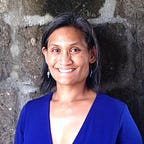Using Data to Solve Problems
mWater and the Effort to End Childhood Diarrhea by Mapping Water Sources
Annie Feighery, CEO of mWater, domain expert in maternal and child health, behavioral health, doctorate in health and behavior, Columbia University grad, and mother of three is on a mission: to use data to create an exit strategy for aid.
Through her social enterprise mWater, she is making a positive difference by using technology and data to end diarrheal disease, the top killer of children under five worldwide. Many organizations and governments have worked on this crisis for decades but there has been no significant decrease in the incidence of waterborne disease. A big reason is the old fashioned, paper and hard drive silo’d approaches that keep organizations and individuals from collaborating and building on each other’s work.
mWater applies cutting edge technology to move the aid industry’s paper-based monitoring and evaluation to a free, open access digital platform.
This gateways water, sanitation, and health data into a global database that will be the world’s first opportunity to datamine water and health, revealing patterns and solutions.
This also allows outside aid organizations to collaborate with local governments and community groups because the data collection platform is free and open access.
A popular aid organization approach to the global safe water crisis is to build shallow wells for communities. Many high profile organizations now advertise for you to build a well in your name for your birthday or retirement, for example. mWater’s mobile app allowed the city of Mwanza, Tanzania to map their water sources and monitor them for safety. When they looked at the results by type, they saw that these shallow wells are actually very dangerous. They created a policy banning NGOs from digging new shallow wells. They should expand the piped network or make a borehole instead. This data is similar globally and the global database is fueling a fast-moving movement among aid organizations to stop digging cheap, dangerous shallow wells.
How did mWater come into being? Two of mWater’s three cofounders are married.
Annie Feighery has her doctorate in global health and specializes in maternal and child survival in low-income regions of the planet.
John Feighery has a doctorate in earth and environmental engineering and was originally monitoring safe water for NASA’s international space station. The two brought their passions together for safe water for child survival here on earth, and found the very best partner in
Clayton Grassick, who added the app and technology platform to their initial vision for monitoring and data collection as the key to eradicating this terrible social problem afflicting most of the planet.
mWater now has over 4000 small communities, low-income governments, researchers, and organizations mapping sites in 59 countries. mWater maps sites like water sources, sanitation facilities, schools, health clinics, and households and then they monitor them with mobile surveys. mWater provides gold standard surveys organizations may use, or users may design their own. mWater users view their data in the mWater Portal where they create maps and visualizations to download or share. This visualization lets communities lobby for investment, and also lets organizations tell the story of their good work.
Learn more: https://www.facebook.com/mwaterco
